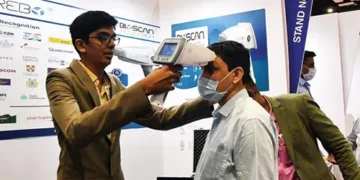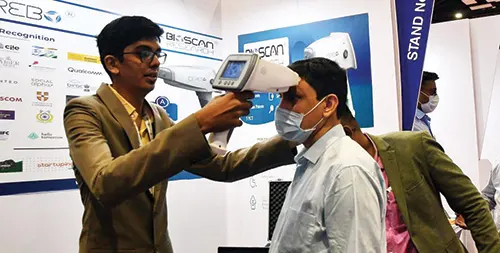Sandeepp Saxena
NEW DELHI: IN a landmark stride for affordable healthcare innovation, the Indian Council of Medical Research (ICMR) has unveiled CEREBO, a fully indigenous handheld device capable of detecting brain injuries such as intracranial bleeding and swelling within minutes. The pioneering tool, developed in collaboration with AIIMS Bhopal, NIMHANS Bengaluru, and Bioscan Research, promises to transform emergency and trauma care across India and beyond.
Resembling the size of a hair dryer, CEREBO uses nearinfrared spectroscopy (NIRS) combined with artificial intelligence algorithms to scan the brain and deliver colour-coded results within 1–2 minutes. Unlike CT or MRI machines, which cost several crores, the device is priced at around Rs 15 lakh, making it far more accessible for deployment in ambulances, rural clinics, and primary health centres.
It requires minimal training—paramedics or even unskilled health workers can learn to operate it in half an hour—opening the door for widespread use in resourceconstrained areas. Officials emphasise that while it does not replace detailed neurological evaluation, it provides a vital first-level screening mechanism that can flag high-risk cases for referral.
India records over one million serious head injury cases annually, with more than 100,000 deaths. Studies indicate that nearly 90 per cent of trauma victims miss timely medical care within the critical “golden hour.” Experts estimate that one in three deaths could be prevented with faster diagnosis and intervention.
By enabling early triage, especially in ambulances and remote settings, CEREBO could drastically reduce these fatalities. “This device bridges the crucial gap between injury and diagnosis, ensuring patients get the right care at the right time,” an ICMR official noted.
The device has successfully undergone feasibility and clinical trials and has received clearance from India’s apex regulator, the Drugs Controller General of India (DCGI). It is now being field-tested in trauma care networks, with states encouraged by ICMR to integrate it into their emergency response systems.
Beyond India, CEREBO has drawn international interest, with prospects of deployment in Africa, the Middle East, and Southeast Asia, where access to CT and MRI facilities is equally limited.
































